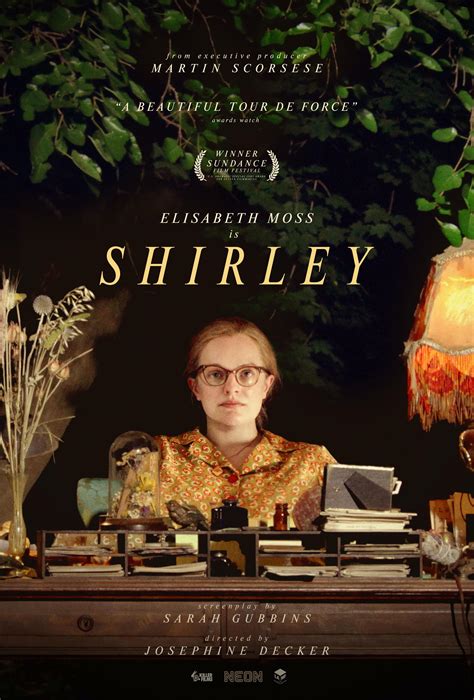Shirley
directed by: Josephine Decker, year: 2020
actors: Elisabeth Moss, Michael Stuhlbarg, Odessa Young, Logan Lerman
actors: Elisabeth Moss, Michael Stuhlbarg, Odessa Young, Logan Lerman

Description:
Shirley is a biographical drama that reimagines gothic author Shirley Jackson during a simmering summer in 1957. Elisabeth Moss portrays Jackson as a brilliant, prickly writer whose sharp wit and volatile mood clash with the expectations of those around her. When a newlywed couple joins her and her husband, the tension spills into the writing room, revealing power games, paranoia, and a fierce creative impulse that blurs fact and fiction. The film's stylized visuals heighten psychological unease.Keywords:
Female Gaze, Drama, Biographical Drama, Psychological Drama, Independent Film, Character StudyWhat the heck is the movie Shirley about?
"Shirley" is a biographical drama that explores the life of renowned horror author Shirley Jackson, known for her works like "The Haunting of Hill House" and "We Have Always Lived in the Castle." Set in the late 1950s, the film follows a young couple, Rose and Fred, who become entangled with Jackson and her husband, Stanley Hyman, as they navigate the complexities of creativity, marriage, and the darker aspects of Jackson's psyche. The film delves into themes of identity, psychological struggle, and the impact of art on life.
Is the movie Shirley a true story?
Yes, the movie "Shirley" is inspired by the life of acclaimed horror writer Shirley Jackson. It focuses on a fictionalized account of her life during the period when she wrote her famous novel "Hangsaman." The film explores her complex relationships, particularly with her husband, Stanley Hyman, and a young couple who come to stay with them. While it draws from real events and Jackson's personality, the narrative also includes fictional elements to enhance the story.
Is Shirley a good movie?
What happened to Rose in the movie Shirley?
In the movie "Shirley," Rose is a young woman who becomes involved with the famous horror writer Shirley Jackson and her husband, Stanley Hyman. As the story unfolds, Rose experiences a tumultuous relationship with Shirley, who is both inspiring and intimidating. Rose's character undergoes significant personal transformation, reflecting themes of identity and ambition. Ultimately, Rose grapples with her own desires and the darker aspects of her relationship with Shirley, leading to a complex conclusion about her future and independence.
Explore More Categories:
Father Son Relationship Survival Alternate History Trust Alcoholism Monochrome Growing Up Consumerism Emotional Intensity Individualism Gore Youth Culture Arthouse Docudrama Mutant Northern Ireland Psychological Manipulation Radiation Pain Motherhood Claustrophobia Buddy Comedy Harassment Character Driven Drama Family Dynamics